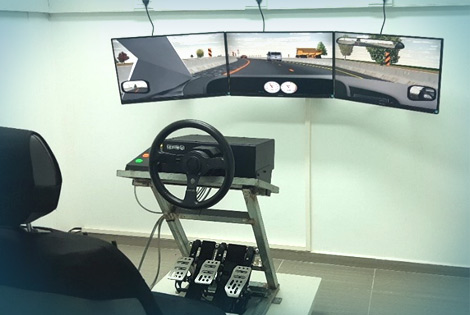The Intelligent Transportation Laboratory focuses on the development, implementation and operation of intelligent transportation systems (ITS). The activities in the laboratory include:
 Traffic control: Research focusing on transportation operation and management in traffic control centers. Implementations include the development of control methods and algorithms, experimentation and evaluation of various sensing and information technologies and their use in traffic management.
Traffic control: Research focusing on transportation operation and management in traffic control centers. Implementations include the development of control methods and algorithms, experimentation and evaluation of various sensing and information technologies and their use in traffic management.
- Driving simulator: Used in experiments to collect driving data in situations (a) that are difficult to observe in naturalistic settings or in field experiments, such as those examining behavior in crash or near-crash situations, or (b) in case of novel non-existing transportation systems. Data collected using the driving simulator can serve as complementary data for real-world data, aiming to study the influence of various in-vehicle systems on driving behavior (e.g., warning systems, semi-automatic driving components).
- Traffic simulation models: Traffic simulation models are effective tools for answering “what-if” questions aiming to reduce the possibility of unwanted influences of new plans, designs and operation techniques. Implementations of traffic simulation models are used in intelligent transportation systems research, operating traffic management centers, safety, public transportation operations, investigating the environmental influences of transportation system investments, geometric design of projects and execution stages.
- Transportation planning: Intelligent transportation systems’ technologies can serve as a basis for planning improvements for the long run of transportation systems and related policies, using geographic information systems (GIS) for storage, analysis and spatial information presentation.
 Intelligent Transportation Laboratory
Intelligent Transportation Laboratory  Traffic control: Research focusing on transportation operation and management in traffic control centers. Implementations include the development of control methods and algorithms, experimentation and evaluation of various sensing and information technologies and their use in traffic management.
Traffic control: Research focusing on transportation operation and management in traffic control centers. Implementations include the development of control methods and algorithms, experimentation and evaluation of various sensing and information technologies and their use in traffic management.